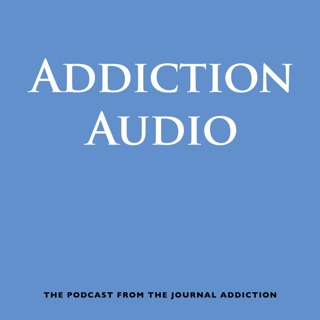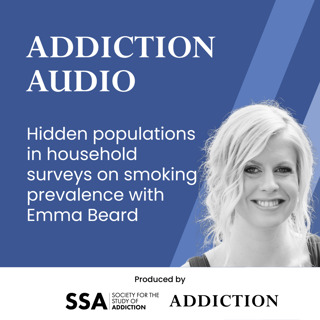
Cannabis and apps with Marleen Olthof and Matthijs Blankers
In this episode, Rob Calder talks to Marleen Olthof and Dr Matthijs Blankers about their research into ICan - a digital health app designed to reduce cannabis use. They initially talk about the potential of using apps to improve health and support people who use drugs before also discussing how apps can improve access to support. “It’s a much smaller step to sign up for a digital intervention than to enter treatment”- Marleen Olthof They discuss how complicated it can be to 'blind' people to a particular condition when researching digital apps and the techniques they used to run a single-blind randomised controlled trial. They then discuss the implications of their findings. Matthijs discusses pre-registration and how this helped the team to prepare; and, how open science principles benefit researchers throughout the research cycle.Original article: A guided digital intervention to reduce cannabis use: The ICan randomized controlled trial by Marleen Olthof and colleagues. Published in Addiction (2023) Hosted on Acast. See acast.com/privacy for more information.
29 Juni 202330min

Long-acting buprenorphine with Jo Neale
Professor Joanne Neale talks to Addiction Audio about her latest research into how people feel during the first 72 hours of having long-acting buprenorphine (Buvidal). Jo talks about the recent history of this medication and how it predated the COVID-19 pandemic and was then brought to attention because it meant that people did not have to attend a pharmacy on a daily basis. Jo also talks about how this can be positive for some people but isn't appropriate for everyone.Jo discusses the gap in the literature around how people respond to long-acting buprenorphine when it is first administered. Jo presents data from the first wave of a longitudinal study examining people's experiences throughout the medication. The findings from this first set of data will be used to help people prepare for the effects and to know what to expect.Jo discusses using an embodiment and embodied cognition approach when analysing the data. This was chosen because the researchers saw how the data quickly became complex."People had these positive and negative experiences at the same time simultaneously; sometimes they were positive physical effects, sometimes they were positive psychological effects, sometimes they were negative physical effects, sometimes they were negative psychological effects. And when we started to map this out, we could see that it was quite complicated and that everything was interacting. And that brought us round to thinking that the concept of embodiment and embodied cognition are quite helpful here because they help us understand how the mind and body interact."Original article: How do patients feel during the first 72 h after initiating long-acting injectable buprenorphine? An embodied qualitative analysis by Joanne Neale and colleagues. Published in Addiction (2023) Hosted on Acast. See acast.com/privacy for more information.
8 Juni 202325min

Smoking and Ecological Momentary Assessment with Olga Perski
Dr Perski explains the evolution of Ecological Momentry Assessment (EMA) studies and how they have been used to collect granular data relating to everyday experiences. Olga's latest review focuses on EMA studies and smoking, looking at lapse and relapse. She talks about how EMA can be used to test and develop models and theories of addiction in ways that cross-sectional studies cannot. She also covers how you can use EMA to capture fluctuating and dynamic changes among people who use drugs."If we go back to thinking about more traditional survey based studies which would measure these constructs weeks apart - knowing that lapses can happen very rapidly in response to very rapidly increased cravings or a cue in the environment. For example, in a bar or restaurant where someone would pick up a cigarette that can very rapidly lead to a lapse. I think that helps emphasis the point that Ecological Momentary Assessment and maybe also sensor data is required in order to pick up these very very rapid fluctuations."Olga then talks about developing an appraisal tool for assessing the quality of EMA studies, which involves looking at reporting guidelines. She then talks about how and why open science principles can be applied to EMA studies.Original article: Within-person associations between psychological and contextual factors and lapse incidence in smokers attempting to quit: A systematic review and meta-analysis of Ecological Momentary Assessment studies by Olga Perski and Colleagues. Published in Addiction (2023) Hosted on Acast. See acast.com/privacy for more information.
10 Maj 202337min

The acute effects of cannabis with Will Lawn
Rob talks to Dr Will Lawn about his research into the acute effects of cannabis on young people and adults. Will talks about setting up a study looking at young people and adults’ experiences of using cannabis with different levels of cannabidiol. He talks about the challenges of blinding participants to different types of cannabis; about how to manage the placebo effect when participants can become quickly aware of whether they have or have not had cannabis and the challenges of running a trial involving a controlled drug.He discusses the study’s findings that suggest that teenagers respond similarly to adults in the acute stages of cannabis use and experience the same short-term harms as adults.He also talks about the importance of selecting the best episode of The Simpsons for an academic study.“In the last four to five years there’s been a swing towards thinking CBD doesn’t really moderate the impact of THC at these kind of 1 to 30mg dose levels”Dr Will Lawn is a Lecturer at King’s College London Psychology DepartmentOriginal article: ‘The acute effects of cannabis with and without cannabidiol in adults and adolescents: a randomised, double-blind, placebo-controlled, crossover experiment by Will Lawn and colleagues. Published in Addiction (2023) Hosted on Acast. See acast.com/privacy for more information.
5 Apr 202332min

Heated tobacco products and nomenclature with Katie East
In this episode, Dr Katherine East talks about her recent article on heated tobacco product use. When conducting this research, Katie talked to former and current smokers who use IQOS to understand the words they use to describe themselves and what they do in relation to heated tobacco products. Katie and Rob then talk about how the language can reflect identity and how this can influence the risk of people relapsing to smoking or other forms of nicotine use. They discuss the importance of social norms and how language can play a substantial role in shaping those norms. Katie explains why some potential words that might have been used have since been discarded, including “heaters” and “IQOSers”. They also talk about different social circumstances and how heated tobacco use, vaping and smoking identities interact. Link to Katie’s previous podcast“Lots of people refer to it as smoking still…. It also means less having to explain what it is because very few people have heard of IQOS”“The way that people refer to things and they way they think about themselves as product users can influence their behaviour.”“Whilst people referred to IQOS use as smoking they were very resistant to being identified as a smoker”. Original article: ‘It's not what you'd term normal smoking’: a qualitative exploration of language used to describe heated tobacco product use and associated user identity by Katherine East and colleagues. Published in Addiction (2022). Hosted on Acast. See acast.com/privacy for more information.
25 Jan 202315min

The rise of disposable vaping products with Harry Tattan-Birch
In this episode, Harry Tattan-Birch talks about his recent article on the increased popularity of disposable vaping products. He discusses the difference between this new generation of vaping products compared with the original versions.He talks about the data that suggest a rise in vaping alongside a lack of change in use of nicotine products overall. And the three reasons why disposable vapes have become more popular; including the low up-front cost, nicotine delivery/nicotine salts, and the convenience.“You can just walk into a shop, buy a device, open the packet and instantly start using it. you don’t have to know anything about coils… the concentration of e-liquid, you don’t have to charge it.”Harry also talks about how the team were able to publish relatively soon after noticing the trend. He talks about using data from the Smoking Toolkit Study and how this supports efficient and effective publishing, enabling researchers to see what’s happening real-time on the nicotine market. Original article: Rapid growth in disposable e-cigarette vaping among young adults in Great Britain from 2021 to 2022: a repeat cross-sectional survey by Harry Tattan-Birch and colleagues. Published in Addiction (2022) Hosted on Acast. See acast.com/privacy for more information.
15 Dec 202223min

Highly processed foods and addiction with Ashley Gearhardt
In this episode of Addiction Audio, Rob Talks to Dr Ashley Gearhardt from the University of Michigan about whether highly processed foods can be considered to be addictive substances.Dr Gearhardt starts by defining highly processed foods before covering the issues that arise from having an addictive substance (such as food) that you can’t ‘opt out’ of. Ashley makes comparisons with other addictive substances noting that highly processed foods can induce cravings and lead to a loss of control. She then talks about which foods have a bigger impact on addictive behaviours highlighting foods that contain refined sugars and added fats such as pizzas and donuts.Rob and Ashley then discuss the limits to research whereby there is little agreement on how to define an addictive substance. This is in stark contrast with a growing consensus on how to identify addictive behaviours. There are, for example, agreed diagnostic criteria for addiction, but there is less agreement on how to define whether a substance is addictive.They also talk about how a substance that isn’t intoxicating can be addictive.“It isn’t necessarily the amount of pleasure or liking you get at the moment you consume them [highly processed foods], but the ability that they have to sensitise motivation systems to want more and more and more”“We argue that we need to treat these highly processed foods, not so much as foods per se but as highly refined substances that have been engineered to be incredibly rewarding.”Original article: Highly processed foods can be considered addictive substances based on established scientific criteria by Ashley Gearhardt and Alexandra DiFeliceantonio. Published in Addiction (2022) Hosted on Acast. See acast.com/privacy for more information.
5 Dec 202232min

Substance use among refugees with Ebtesam Saleh
In this episode of Addiction Audio, Rob talks to Ebtesam Saleh a Doctoral student at the Charite university in Berlin. Ebtesam talks about her recent systematic review of qualitative research on substance use among refugees. She talks about talks about the limitations of using survey data to explore this issue and how qualitative research can help contextualise the problems faced by refugees in a culturally sensitive way. Ebtesam discusses the impact that research can have and how researchers can minimise the potential for re-traumatisation through research interviews. She also discusses the cultural differences in how people view substances and substance use. With substances like coca, betul quid and prescription drugs being viewed, legislated and used in different ways in different countries. There are also multiple barriers to treatment that refugees can experience from stigma to a lack of resources and including structural factors such as health insurance requirements in different countries. Ebtesam then talks about the many refugee groups whose experiences are not present in the literature:“For example, Yemen hosts many refugee populations from African conflict countries; while Yemen itself is a country struggling with civil war, so it looks like a refugee crisis within a country of crisis. So, a crisis within the crisis” Hosted on Acast. See acast.com/privacy for more information.
4 Okt 202221min





















